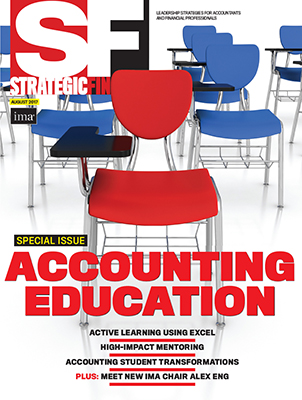Trust is perhaps the most important quality of an ethical culture in business and society because it affects every aspect of life—home, career, and community. Business can’t take place without each party to a transaction having trust that the other party will fulfill its expected obligations. Without an ethical culture of trust, based on truth and transparency, human beings would be unable to transact business. Management accountants should do their part in their organizations by always being truthful in words and actions. Members of IMA® (Institute of Management Accountants) also are required by the IMA Statement of Ethical Professional Practice to take an active part in ensuring their organization has a strong, open, and positive ethical culture rather than a weak one. Silent acceptance of unethical policies and procedures isn’t sufficient.
Unfortunately, the level of trust in business and other institutions continues to fall, according to the 2017 Edelman Trust Barometer (ETB). In 20 of the 28 countries surveyed, less than half of the people trust the mainstream institutions of business, government, media, and nongovernmental organizations (NGOs) to do what’s right. That’s an increase in distrust from last year when just more than half the countries fell into that category. Business is distrusted in 13 countries, and, in general, the public is hungry for greater regulation of business, not less. For instance, 82% say the pharmaceutical industry should have stronger regulations. Also, 70% of the general population believe policymakers should put a tax on food products that have a negative effect on health, and 53% don’t believe that financial market reforms have achieved their intended objective of increasing market stability.
The polarization of thought in many areas of the world has encouraged the circulation of information that supports a particular point of view. Psychologists believe it’s human nature to crave support for a person’s existing views. As a consequence, the technological revolution has allowed the creation of what Edelman calls “media echo chambers,” letting a person reinforce, rather than to debate or reconsider, a current viewpoint.
In fact, 59% of ETB survey respondents would believe the truthfulness of a search engine rather than a human editor or other professional. “Fake” news seems to be spreading from the political arena to all areas of society. ETB reports that information from other employees is trusted more than that from CEOs or owners for information affecting customers or other employees. In terms of financial data, the trust gap between CEO messaging and that of employees is 38 percentage points.
Noting the spread of potentially fake, untruthful, or misleading financial disclosures, the Securities & Exchange Commission (SEC) has cracked down on the work of 27 individuals and entities for allegedly spreading fake stock news. The illegal stock promotion schemes left investors with the impression they were receiving independent, unbiased analysis from investing websites. Actually, the writers of the promotional materials were being secretly compensated for touting the so-called merits of a company stock.
According to the SEC, more than 250 articles contained false statements that the writers hadn’t been compensated by the companies they were writing about. The SEC brought fraud charges against three public companies and seven stock promotion or communications firms as well as two company CEOs, six individuals at the firms, and nine writers. Melissa Hodgman, associate director of the SEC’s Division of Enforcement, said, “Our markets cannot operate fairly when there are deliberate efforts to reach prospective investors with positive articles about a stock while hiding that the companies paid for those articles.”
A nationwide poll by the AICPA (American Institute of Certified Public Accountants) reveals that 63% of Americans are very concerned about the effect of fake news on critical financial decision making. They report difficulty in making healthcare decisions (44%), stock market investing (40%), deciding whether to retire (36%), buying or selling a business (36%), buying or selling a house (35%), starting a business (35%), and deciding whether to change jobs (29%). Greg Anton, chair of the AICPA’s National CPA Financial Literacy Commission, said, “Financial decisions around healthcare, investments and retirement can have serious, long-term implications. It can be difficult enough to understand the financial impact of proposed changes in laws and regulations without having to deal with a sea of disinformation. Social media can serve to amplify the impact of fake news, particularly when many people are sharing articles that come to the same conclusion.”
Strategy&, the PricewaterhouseCoopers strategy consulting business, conducted a study called CEO Success, which reported that, among other findings, the number of CEOs forced out of office for ethical lapses has been on the rise. Although the study was based on large companies, the lessons learned apply to companies of all sizes. One of the causes cited in the study is the changing business operating environment. Pursuit of growth in emerging markets can result in heightened ethical risks, including bribery and corruption. Relying on global supply chains can lead to increased counterparty risks.
Management accountants and financial managers should rely on the guidance contained in the IMA Statement of Ethical Professional Practice that sets forth four overarching principles that support ethical behavior: honesty, fairness, objectivity, and responsibility. Promises made to customers, employers, or other stakeholders should always result in promises kept. They should also engage in trust building that helps people develop mutual respect, understanding of varying points of view, and openness in the organization. These are keys to effective teamwork and enhanced communication.
IMA ETHICS HELPLINE
For clarification of how the IMA Statement of Ethical Professional Practice applies to your ethical dilemma, contact the IMA Ethics Helpline.
In the U.S. or Canada, dial (800) 245-1383. In other countries, dial the AT&T USA Direct Access Number from www.usa.att.com/traveler/index.jsp, then the above number.
The IMA Helpline is designed to provide clarification of provisions in the IMA Statement of Ethical Professional Practice, which contains suggestions on how to resolve ethical conflicts. The helpline cannot be considered a hotline to report specific suspected ethical violations.

August 2017



